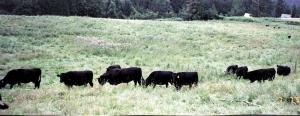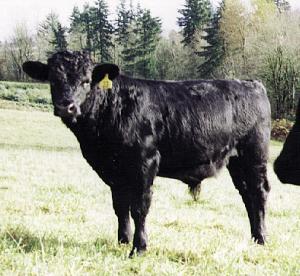New Breed Of Cattle Were "Bred For Taste"
"I'm not trying to break new ground. This breed is an attempt to go back to the good old days when beef cattle were smaller, more efficient, and bred for taste," says Roy Atherton, Gresham, Oregon, about his "new" breed of cattle called "American Early Blacks".
Atherton started looking 20 years ago for a better breed of cattle. "I wanted to go back to the beginnings of beef, the smaller, original breeds from England that made beef the world's most popular food. By chance I be-came familiar with the Irish Dexter breed. Around the same time I started studying Wagyu cattle from Japan. It seemed to me there were many similarities between the breeds but some drawbacks with the way both breeds were being developed."
In Japan, tender Wagyu beef has been known to sell for as much as $200 a lb. North American breeders have promoted its as the beef "that's good for you" because of its high content of unsaturated fat.
Dexter cattle have usually been promoted as a miniature breed that makes efficient use of limited pasture space.
Atherton decided to start a cross-breeding program between the two that resulted in the new American Early Blacks.
"The criteria for these animals is their small size and their ability to produce high quality marbled, tasty and tender meat. To be registered, a herd must be tested to show the percentage of unsaturated to saturated fat, as well as other nutritional criteria."
American Early Blacks are 1/2 Dexter and 1/2 Wagyu. Almost all are black, although some red animals do appear. Mature weight of cows is from 750 to 900 lbs. Bulls mature at 900 to 1,200 lbs. Each registered herd owner is obligated to submit to an analysis of the fatty acid profile of his herd.
"Anyone who tries our beef recognizes that it's the very best beef on the market. We didn't create anything new. We changed the objective toward producing quality, rather than quantity, by getting back to the great-tasting meat that made beef so popular. The trend toward bigger animals to supply the fast food industry has not necessarily resulted in the best tasting product," says Atherton.
A number of other breeders of American Early Blacks are already established. Breeding stock is available.
Contact: FARM SHOW Followup, Roy Atherton, American Early Blacks Cattle Association, 21125 S. E. Yamhill, Gresham, Ore. 97030 (ph 503 666-5356).

Click here to download page story appeared in.
Click here to read entire issue
New Breed Of Cattle Were "Bred For Taste" LIVESTOCK Beef 22-6-10 "I'm not trying to break new ground. This breed is an attempt to go back to the good old days when beef cattle were smaller, more efficient, and bred for taste," says Roy Atherton, Gresham, Oregon, about his "new" breed of cattle called "American Early Blacks".
Atherton started looking 20 years ago for a better breed of cattle. "I wanted to go back to the beginnings of beef, the smaller, original breeds from England that made beef the world's most popular food. By chance I be-came familiar with the Irish Dexter breed. Around the same time I started studying Wagyu cattle from Japan. It seemed to me there were many similarities between the breeds but some drawbacks with the way both breeds were being developed."
In Japan, tender Wagyu beef has been known to sell for as much as $200 a lb. North American breeders have promoted its as the beef "that's good for you" because of its high content of unsaturated fat.
Dexter cattle have usually been promoted as a miniature breed that makes efficient use of limited pasture space.
Atherton decided to start a cross-breeding program between the two that resulted in the new American Early Blacks.
"The criteria for these animals is their small size and their ability to produce high quality marbled, tasty and tender meat. To be registered, a herd must be tested to show the percentage of unsaturated to saturated fat, as well as other nutritional criteria."
American Early Blacks are 1/2 Dexter and 1/2 Wagyu. Almost all are black, although some red animals do appear. Mature weight of cows is from 750 to 900 lbs. Bulls mature at 900 to 1,200 lbs. Each registered herd owner is obligated to submit to an analysis of the fatty acid profile of his herd.
"Anyone who tries our beef recognizes that it's the very best beef on the market. We didn't create anything new. We changed the objective toward producing quality, rather than quantity, by getting back to the great-tasting meat that made beef so popular. The trend toward bigger animals to supply the fast food industry has not necessarily resulted in the best tasting product," says Atherton.
A number of other breeders of American Early Blacks are already established. Breeding stock is available.
Contact: FARM SHOW Followup, Roy Atherton, American Early Blacks Cattle Association, 21125 S. E. Yamhill, Gresham, Ore. 97030 (ph 503 666-5356).
To read the rest of this story, download this issue below or click
here to register with your account number.








